Officials, academics and experts discuss the country’s international standing at the Global Times Annual Conference
Editor's Note
The Global Times Annual Conference was held at the China World Hotel in Beijing on Saturday, inviting government officials, experts and academics to participate in a day of in-depth discussions on current world trends under the theme "China's quest in a faltering world."
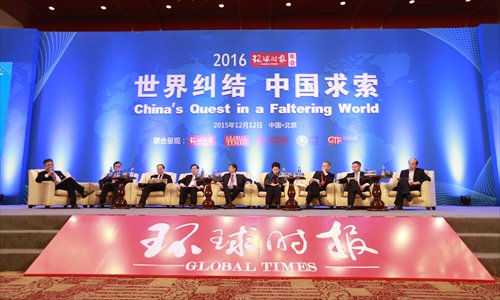
Guests participate in a discussion as part of the Global Times Annual Conference in Beijing, December 12. Photo: Li Hao/GT
Who's writing the rules, China or the US?
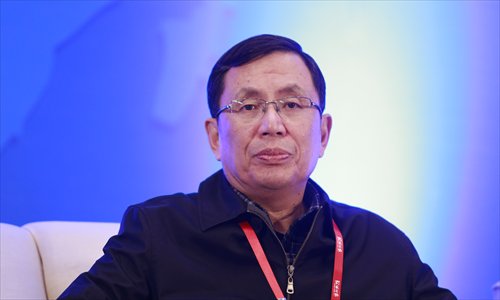
Chen Xiaogong, member of the foreign affairs committee of the National People's Congress; retired lieutenant general
Through several of his speeches this year, US President Barack Obama has made it clear that a conflict exists between China and the US, a conflict of who should write the rules. Obama says that it should be the US, not China, writing the rules. This conflict will decide the future of the world order, and according to history, developing and developed countries will very likely take opposing stands.
Take the Internet for example. It's an area that hasn't yet been fully covered by international law and international society has been discussing universal rules and regulations. Whether each country should have the right to control its domestic Internet space, or "Internet sovereignty," is now a major issue at the heart of the debate. Developed countries like the US and developing countries like China have very different views. The recent conflict between China and the US in the South China Sea is another example. It shows how dangerous it can become if this conflict between China and the US isn't contained.

Jin Canrong, associate dean of the School of International Studies at Renmin University of China
I think it's now still a bit too early to say whose rules will govern the world, China's or those of the US. China is still at an early stage of setting up its own rules, although in recent years it has more or less started to think about how to establish a better world order.
But the China-US relationship has indeed entered a new phase, mainly because China is now competing for more international influence. This is also the background to the recent distrust between China and the US. Before, China's rise didn't pose any threat to the global American order, and the US welcomed China to join it. But as China started to become more powerful and dominant, establishing the Asian Infrastructure Investment Bank and the Belt and Road initiative, for example, the US is becoming more worried.
Are Japanese apologies sincere?
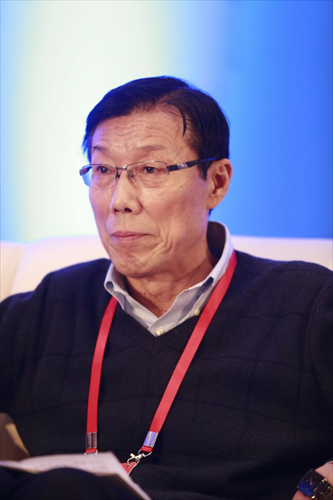
Ma Licheng, research fellow at the University of Tokyo
I think the China-Japan relationship has ameliorated in recent years. Top Chinese officials, including Xi Jinping, Zhang Dejiang and Yu Zhengsheng, when meeting Japanese leaders, have all reiterated that the two countries will commit to the four political documents issued between China and Japan since 1972, which have served as a basis for China-Japan relations. This shows that the China-Japan relationship is highly stable.
Now regarding Japan's history problem. I agree we should criticize Shinzo Abe for his lack of sincerity in his apology for Japan's wartime aggression. However, mainstream Japanese government and society does take responsibility for Japan's wartime crimes. Japanese leadership has made 25 formal apologies for war responsibilities, according to my research. Former Prime Minister Tomiichi Murayama, especially, issued a groundbreaking apology in 1995. The Chinese government responded positively to these apologies. Many Chinese people resent Japan for not apologizing, which is itself wrong.
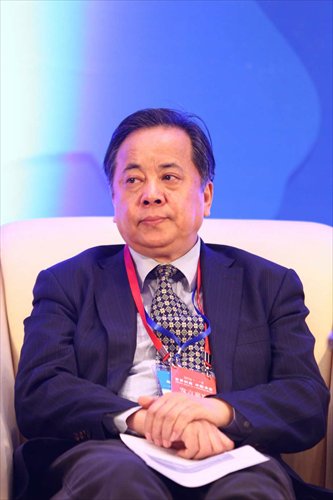
Liu Jiangyong, vice director of the Institute of Modern International Relations of Tsinghua University
A basic fact is, the Japanese government has never made a written apology to China. Nor has it apologized through its national diet. Shinzo Abe's statement this year is so insincere that it's a big step backward regarding its history problem.
Now Japan's defense strategy is especially dangerous. Abe is now visiting India and he is now pushing a nuclear energy deal with India. The Abe administration's nuclear ambition is now under way. His first step is to create the impression in Japan that China is a threat, and that the US is unreliable. Domestically, by declaring that the Diaoyu Islands are Japan's territory, it is trying to minimize Japanese people's fear of nuclear weapons. Internationally, through nuclear cooperation with India, Japan is trying to send a message that it is not far from having nuclear weapons. All these efforts, obviously, are targeted at China.
Why is Russia so assertive?
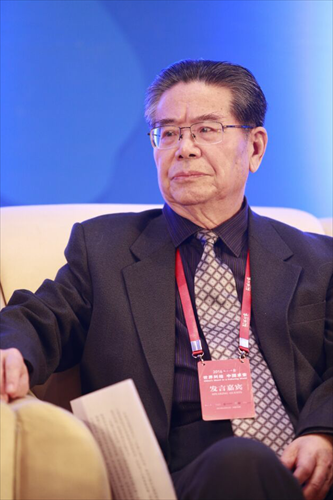
Wang Haiyun, senior adviser at the China Institute for International Strategic Studies; major general
Why is Russia being politically assertive, and how far can it go? We should first understand that it is Western pressure that has led to Russia's aggressiveness. Second, it is Russia's strategic tradition to pursue the status of being a global power. Russia values the status and dignity associated with being a powerful state. This is why it has been showcasing its greatness. Russia's assertiveness is also in line with its national characteristics. According to history, Russia has rarely succumbed to pressure from the outside.
Russia's relatively strong military power is an important basis for its aggressiveness. Although it cannot compare with the era of Soviet Union, it's still the second strongest military power in the world, intimidating its rivals. Recent military reforms has also brought progress to its army.
Therefore I don't think an economic crisis will change Russia's aggressiveness. The assertiveness of the Putin administration is rational, and will stay for a long time.
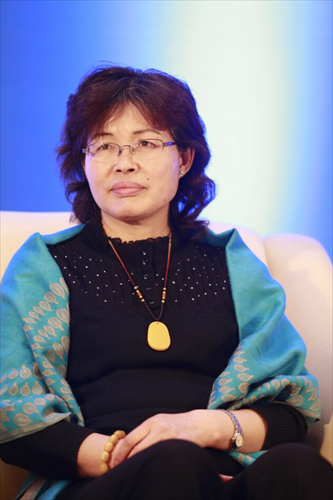
Zuo Fengrong, professor at the Institute for International Strategies at the Party School of the Central Committee of the Communist Party of China (CPC)
I think Russia's assertiveness will last until Putin achieves his goal. The Putin administration started to strike IS targets in Syria this year. Despite its economic difficulties, Russia is pushing for the establishment of the Eurasian Economic Union and trying to boost its influence in former Soviet Union countries. It's also strengthening its military power. The main purpose of these efforts is still to maintain national security, because jihadists pose a great threat to Russia.
Another reason is that Russia wants to boost its influence in the Middle East. Historically, the Soviet Union had a big influence on countries like Syria, Iraq and Egypt. If Bashar al-Assad is ousted from power, Russia will lose an important partner in the Middle East.
Russia is also trying to win Western recognition as a major power through these efforts. It wants to be seen as a country that can set the global political agenda. If Putin doesn't achieve this, he will continue to be assertive.
Who are the 'hostile forces' facing China?
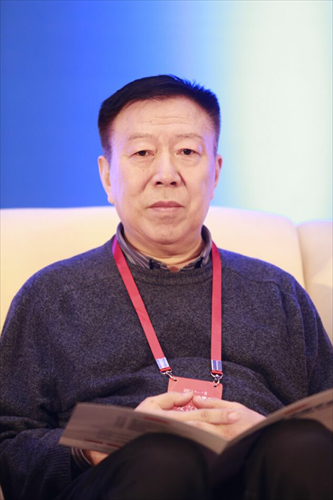
Zhou Xiaozheng, sociology professor at the Renmin University of China
To what extent do "hostile forces" exist? From a sociological point of view, a country under the rule of law only has criminals, no enemies. China used to regard class struggle as its criteria to judge who are its domestic "hostile forces."
But after the Party admitted that it was a mistake, there are no longer hostile forces in China, only people who have broke the law. The law is the only criteria, and this should be the essence of socialist ideology.
In terms of international relations, the logic is the same. If there are "hostile forces," they are the terrorists, who are the common enemy of human kind. China is against all kinds of terrorism. Countries that have diplomatic relations with China, however, should not be regarded as enemies or hostile forces. Take the US as an example, China and US share a common future, and we should by no means regard it as a hostile force.
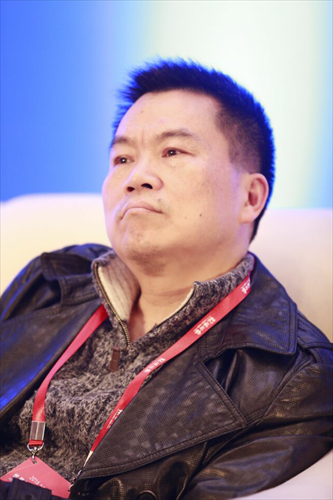
Ren Jiantao, professor of politics at the Renmin University of China
When we talk about "hostile forces," we are dividing the world into enemies and friends. If we look at the world hostilely, we'll find that there are enemies everywhere - too many countries differ with us in ideology, political systems and economical interests. But if we regard too many countries as enemies, we're also admitting that we have fewer friends. So if China wants to play a bigger role in global politics and have a better international environment for its growth, it should look at the world in a friendly way, and get along with countries who have conflicting interests with us.
How to boost China's economy?
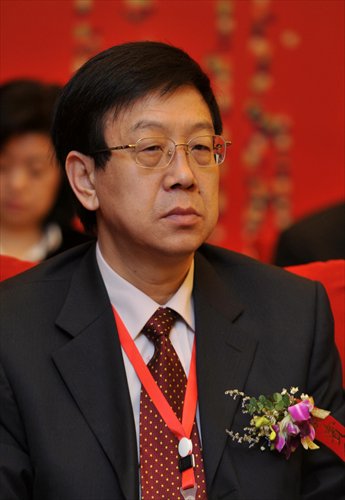
Zhou Tianyong, deputy director at the Institute for International Strategic Studies of the Party School of the Central Committee of the CPC
How to boost China's economy? One of the most direct way is to encourage population growth and open the two-child policy to the entire country, or even abolish the limits on children. If by 2020, China's population can grow at 3 million a year, it will equal to 5 trillion yuan ($770 billion) in GDP.
Another way is to boost China's population mobility. The effect of urbanization on our economy will soon run out, but due to our household registration policy and land policy, our people are not mobilized enough - the land is urbanized, but people are not urbanized. This is another growth point.
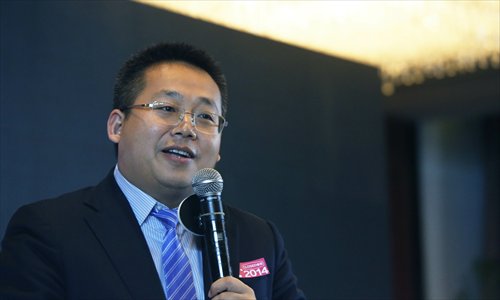
Yi Peng, director-general of PanGoal Institution
Entrepreneurship and innovation are two important remedies to China's economy. But we can't over simplify entrepreneurship and innovation - they are not just Internet finance. For one thing, we should dismantle the security walls around our research institutes and centers, and ask them to share more of their results.
Newspaper headline: China’s quest in a faltering world